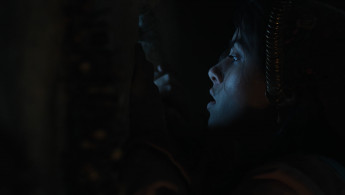Netflix Nakba film Farha celebrated in US by Palestinians, allies as showing history of Israeli crimes
The film Farha is difficult to watch. But for Palestinians and their advocates in the US, it is one step in overcoming another difficult issue: denial of Palestinians' history of displacement.
"It was tough to watch. It was brilliant, powerful, brave, gut-wrenching. It was a young Palestinian girl's determination to survive despite the atrocities of the Nakba," Souzan Naser, a leading member of the Chicago chapter of the US Palestinian Community Network, told The New Arab.
"The main character should stand out as one that's full of courage. She was headstrong, defied tradition, and moved out of her village to continue her studies. It was her will to survive that embodied Farha throughout the entire film," she said.
The film's depiction of the Nakba, the catastrophe for Palestinians and the war of independence for Israelis, is in stark contrast with what is depicted in the US media of Palestinians generally.
A 2019 study by 416Labs, a Canadian data and research group which is no longer available online, but whose main findings are referenced in several articles, found that US newspapers are more than twice as likely to cite Israeli sources in headlines than Palestinian ones.
Growing up in the US, many Palestinians find themselves in the difficult position of knowing their homeland's history from their elders, while also being aware of a very different view being portrayed in the country's media. They are often the ones to tell Americans unfamiliar with the region about their homeland's history.
"We're constantly teaching and educating those around us. A lot of us have had to educate our friends and colleagues growing up." Mohamad Habehh, national development coordinator with American Muslims for Palestine, told TNA. "I'm proud to say I have friends from all walks of life who have an understanding of what happened."
"Farha takes the opportunity to unlearn all of the lies and examine the double standards in our corporate media," said Naser. "These efforts to erase our lived experiences and to silence us didn't begin with Farha," she added, referring to organised efforts to give the film low online ratings and to limit its distribution.
This has slowly but increasingly been changing in recent years with the rise of social media, alternative news outlets, and in recent months with the coverage of Palestinians being expelled from their homes by Israel in occupied Jeruselem and the killing of Palestinian American journalist Shireen Abu Akleh by an Israeli soldier.
However, gaps in the US remain in basic knowledge of Palestinians. As recently as October of this year, the publication USA Today ran a piece titled: Fact check: References to Palestine are ancient; term didn't originate with Yasser Arafat. Though possibly amusing to those familiar with the region's history, it is also a reminder of Americans' apparent information gap.
Adam Shapiro, a US filmmaker who made a documentary about Nakba survivors, was struck by the sounds of war planes in Farha, which was consistent with stories he'd heard in his interviews.
"Villages came under aerial bombardment. It's something a lot of people don't realise or appreciate," he told TNA.
Though he sees Farha as an important film about the Palestinian story, he doesn't expect it to make a major difference in changing Americans' perspectives on the issue, something he believes will take time. For now, many fans of the film are appreciating its moment.
"This is a major victory. This is a major media platform," Naser said, referring to Netflix. "When I think about the movie, it's like a declaration that our stories deserve to be told and are meant to survive."




 Follow the Middle East's top stories in English at The New Arab on Google News
Follow the Middle East's top stories in English at The New Arab on Google News


![A group of Palestinians, foreign and Israeli activists gather to participated in an olive picking event on the land in the town of Battir, which is under threat of confiscation by Israel in Bethlehem, occupied West Bank on 8 November 2024. [Getty]](/sites/default/files/styles/image_330x185/public/2182930803.jpeg?h=199d8c1f&itok=__0LgGsa)